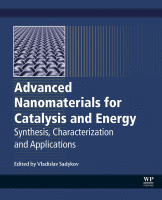Browse content
Table of contents
Actions for selected chapters
- Full text access
- Book chapterAbstract only
Chapter 1 - Synthesis of Nano-Catalysts in Flow Conditions Using Millimixers
Changdong Li, Maoshuai Li and Andre C. van Veen
Pages 1-28 - Book chapterAbstract only
Chapter 2 - Influence of Hydrodynamics on Wet Syntheses of Nanomaterials
Nicholas Jose and Alexei Lapkin
Pages 29-59 - Book chapterAbstract only
Chapter 3 - Advanced Size-Selected Catalysts Prepared by Laser Electrodispersion
Tatiana N. Rostovshchikova, Ekaterina S. Lokteva, ... Vladimir M. Kozhevin
Pages 61-97 - Book chapterAbstract only
Chapter 4 - Ruthenium Nanomaterials: An Overview of Recent Developments in Colloidal Synthesis, Properties, and Potential Applications
Irina L. Simakova and Dmitry Yu. Murzin
Pages 99-141 - Book chapterAbstract only
Chapter 5 - Ag-Containing Nanomaterials in Heterogeneous Catalysis: Advances and Recent Trends
Olga V. Vodyankina, Grigory V. Mamontov, ... Mikhail A. Salaev
Pages 143-175 - Book chapterAbstract only
Chapter 6 - How Does the Surface Structure of Ni-Fe Nanoalloys Control Carbon Formation During Methane Steam/Dry Reforming?
Stavros Alexandros Theofanidis, Hilde Poelman, ... Vladimir V. Galvita
Pages 177-225 - Book chapterAbstract only
Chapter 7 - Recent Applications of Nanometal Oxide Catalysts in Oxidation Reactions
V. Cortés Corberán, V. Rives and V. Stathopoulos
Pages 227-293 - Book chapterAbstract only
Chapter 8 - Particle-Size Effect in Catalytic Oxidation Over Pt Nanoparticles
Alexandr Yu. Stakheev, Dmitry A. Bokarev, ... Valerii I. Bukhtiyarov
Pages 295-320 - Book chapterAbstract only
Chapter 9 - Novel Zeolite Catalysts for Methanol to Hydrocarbon Transformation
Evgeny Rebrov and Guannan Hu
Pages 321-356 - Book chapterAbstract only
Chapter 10 - Semiconductor Photocatalysts Based on Nanostructured Cd1 − xZnxS Solid Solutions in the Reaction of Hydrogen Evolution From Aqueous Solutions of Inorganic Electron Donors Under Visible Light
Ekaterina A. Kozlova and Valentin N. Parmon
Pages 357-391 - Book chapterAbstract only
Сhapter 11 - Nanocomposite Alkali-Ion Solid Electrolytes
Nikolai F. Uvarov, Artem S. Ulihin and Yulia G. Mateyshina
Pages 393-434 - Book chapterAbstract only
Chapter 12 - Advanced Materials for Solid Oxide Fuel Cells and Membrane Catalytic Reactors
Vladislav A. Sadykov, Natalia V. Mezentseva, ... Mikhail A. Mikhailenko
Pages 435-514 - Book chapterAbstract only
Chapter 13 - Mixed Ionic-Electronic Conducting Perovskites as Nanostructured Ferroelastics
Irina V. Belenkaya, Olga A. Bragina and Alexander P. Nemudry
Pages 515-555 - Book chapterNo access
Index
Pages 557-567
About the book
Description
Advanced Nanomaterials for Catalysis and Energy: Synthesis, Characterization and Applications outlines new approaches to the synthesis of nanomaterials (synthesis in flow conditions, laser electrodispersion of single metals or alloys on carbon or oxide supports, mechanochemistry, sol-gel routes, etc.) to provide systems with a narrow particle size distribution, controlled metal-support interaction and nanocomposites with uniform spatial distribution of domains of different phases, even in dense sintered materials. Methods for characterization of real structure and surface properties of nanomaterials are discussed, including synchrotron radiation diffraction and X-ray photoelectron spectroscopy studies, neutronography, transmission/scanning electron microscopy with elemental analysis, and more.
The book covers the effect of nanosystems' composition, bulk and surface properties, metal-support interaction, particle size and morphology, deposition density, etc. on their functional properties (transport features, catalytic activity and reaction mechanism). Finally, it includes examples of various developed nanostructured solid electrolytes and mixed ionic-electronic conductors as materials in solid oxide fuel cells and asymmetric supported membranes for oxygen and hydrogen separation.
Advanced Nanomaterials for Catalysis and Energy: Synthesis, Characterization and Applications outlines new approaches to the synthesis of nanomaterials (synthesis in flow conditions, laser electrodispersion of single metals or alloys on carbon or oxide supports, mechanochemistry, sol-gel routes, etc.) to provide systems with a narrow particle size distribution, controlled metal-support interaction and nanocomposites with uniform spatial distribution of domains of different phases, even in dense sintered materials. Methods for characterization of real structure and surface properties of nanomaterials are discussed, including synchrotron radiation diffraction and X-ray photoelectron spectroscopy studies, neutronography, transmission/scanning electron microscopy with elemental analysis, and more.
The book covers the effect of nanosystems' composition, bulk and surface properties, metal-support interaction, particle size and morphology, deposition density, etc. on their functional properties (transport features, catalytic activity and reaction mechanism). Finally, it includes examples of various developed nanostructured solid electrolytes and mixed ionic-electronic conductors as materials in solid oxide fuel cells and asymmetric supported membranes for oxygen and hydrogen separation.
Key Features
- Outlines synthetic and characterization methods for nanocatalysts
- Relates nanocatalysts' properties to their specific applications
- Proposes optimization methods aiming at specific applications
- Outlines synthetic and characterization methods for nanocatalysts
- Relates nanocatalysts' properties to their specific applications
- Proposes optimization methods aiming at specific applications
Details
ISBN
978-0-12-814807-5
Language
English
Published
2019
Copyright
Copyright © 2019 Elsevier Inc. All rights reserved.
Imprint
Elsevier
